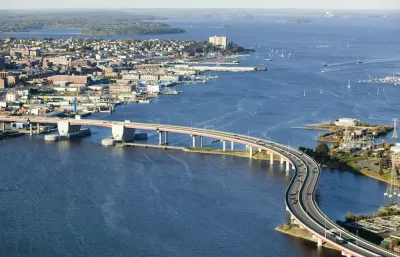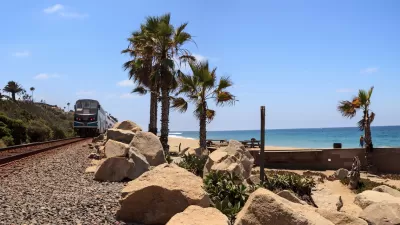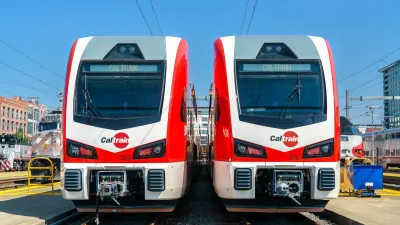A more concerted effort could bring together the state's recent plans and federal infrastructure investment to link the region and reduce greenhouse gas emissions.

Tony Donovan, writing in the Press Herald, argues that Maine leaders should take advantage of recent infrastructure investments and newly available federal funding to make a major push for a more well-connected rail system in the state.
"In 2020 the Governor’s Climate Council report found that the transportation sector is responsible for 54 percent of Maine’s total greenhouse-gas emissions, and that the Climate Council goal is to reduce emissions by 80 percent. The state now has in hand the Lewiston/Auburn Passenger Rail Service Plan, which positions Maine to address these needs head on," writes Donovan. The state's plan promises to move up to 600,000 commuters daily on hybrid-electric trains and bring a long-awaited connection to Montreal.
The holdup in completing these projects, according to Donovan, has been cost. "To succeed with innovative projects to meet much-needed goals, we cannot shy away from the costs. The costs of the status quo are much greater." With signs that the new administration will fund substantial infrastructure investments and private investors looking to train station sites as ripe for development, Donovan believe that Maine, a state with "the experience of creating and operating one of the most successful passenger train operations in the country," is uniquely positioned to develop a modern, comprehensive train system that will take vehicles off the road and provide seamless regional links.
FULL STORY: It is the perfect time for putting Maine on the move

Planetizen Federal Action Tracker
A weekly monitor of how Trump’s orders and actions are impacting planners and planning in America.

Congressman Proposes Bill to Rename DC Metro “Trump Train”
The Make Autorail Great Again Act would withhold federal funding to the system until the Washington Metropolitan Area Transit Authority (WMATA), rebrands as the Washington Metropolitan Authority for Greater Access (WMAGA).

The Simple Legislative Tool Transforming Vacant Downtowns
In California, Michigan and Georgia, an easy win is bringing dollars — and delight — back to city centers.

The States Losing Rural Delivery Rooms at an Alarming Pace
In some states, as few as 9% of rural hospitals still deliver babies. As a result, rising pre-term births, no adequate pre-term care and "harrowing" close calls are a growing reality.

The Small South Asian Republic Going all in on EVs
Thanks to one simple policy change less than five years ago, 65% of new cars in this Himalayan country are now electric.

DC Backpedals on Bike Lane Protection, Swaps Barriers for Paint
Citing aesthetic concerns, the city is removing the concrete barriers and flexposts that once separated Arizona Avenue cyclists from motor vehicles.
Urban Design for Planners 1: Software Tools
This six-course series explores essential urban design concepts using open source software and equips planners with the tools they need to participate fully in the urban design process.
Planning for Universal Design
Learn the tools for implementing Universal Design in planning regulations.
Smith Gee Studio
City of Charlotte
City of Camden Redevelopment Agency
City of Astoria
Transportation Research & Education Center (TREC) at Portland State University
US High Speed Rail Association
City of Camden Redevelopment Agency
Municipality of Princeton (NJ)





























